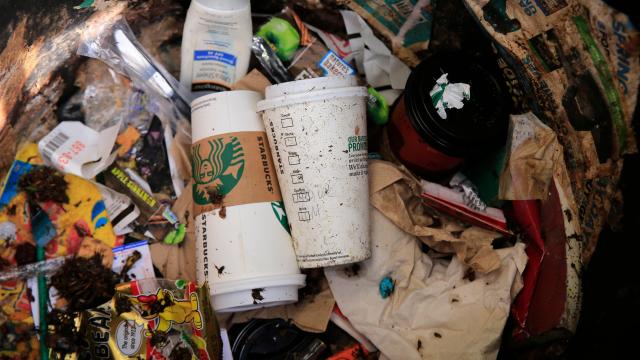In recent years, drink chains have switched their single-use cups from plastic to paper to avoid plastic pollution and pile-ups in landfills. But according to recent research, the plastic cup that we feel good walking out of a cafe with isn’t great for the environment either.
A study published last month in the journal Environmental Pollution outlines how paper cups can leach toxic materials into the surrounding environment. This is because paper cups are often coated in a layer of polylactic acid, otherwise known as PLA. It’s a bioplastic and is touted as a biodegradable alternative to traditional plastic. However, researchers found that it caused adverse health effects in aquatic midge larvae.
Researchers at the University of Gothenburg tested the effects of both plastic cups and paper cups on the midge larvae. Both types of cups were put in water or sediments for up to four weeks. The larvae were then put into aquariums that contained the sediment and water that once held the plastic and paper cups. The contaminated sediment and water were tested separately.
“We observed a significant growth inhibition with all the materials tested when the larvae were exposed in contaminated sediment,” the researchers wrote in the study. “Developmental delays were also observed for all materials, both in contaminated water and sediment.”
They found that growth challenges and developmental delays were observed in environments where the cups leached into them for only one week. The negative effects of the exposure increased in the water and sediment that held the paper and plastic cups for longer periods of time. This challenges the belief that bioplastics are safer. PLA does break down faster than traditional fossil fuel-based plastic material, but the study results show that they aren’t much safer.
“Bioplastics does not break down effectively when they end up in the environment, in water,” Bethanie Carney Almroth, a professor at the University of Gothenburg and study author, said in a press release. “There may be a risk that the plastic remains in nature and resulting microplastics can be ingested by animals and humans, just as other plastics do. Bioplastics contain at least as many chemicals as conventional plastic.”
Other previous studies have found that the plastic coating in paper cups can also create microplastics that enter the liquid in the cup. In 2019, a research group based out of India filled paper cups with hot water and found that there were an alarming amount of microplastic particles in a paper cup after filling the cups with hot liquids, Wired reported. The researchers found that there were about 25,000 particles per 100 ml cup after 15 minutes.
Sadly, microplastics are everywhere. On mountains, in Antarctic snow, and even in human blood. The world doesn’t need more of it littering waterways and other natural environments. A study released last week by researchers at the University of Rhode Island found that mice exposed to microplastics showed signs of neurological issues.
The researchers said that one of the best ways to avoid the spread of plastic toxins and microplastics would be to completely do away with single-use items. “When disposable products arrived on the market after the Second World War, large campaigns were conducted to teach people to throw the products away, it was unnatural to us,” Almroth said. “Now we need to shift back and move away from disposable lifestyles.”
Want more climate and environment stories? Check out Earther’s guides to decarbonizing your home, divesting from fossil fuels, packing a disaster go bag, and overcoming climate dread. And don’t miss our coverage of the latest IPCC climate report, the future of carbon dioxide removal, and the un-greenwashed facts on bioplastics and plastic recycling.
